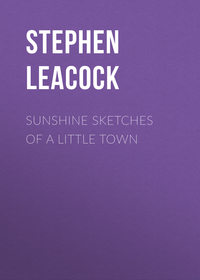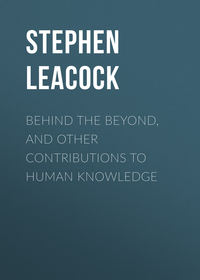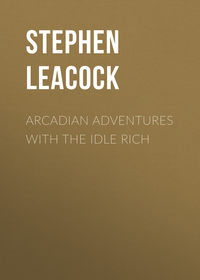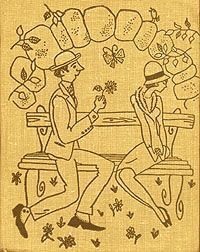 полная версия
полная версияFrenzied Fiction
Never mind. I will walk up and down again with the magazines under my arm. That will make people think I live here. Better still if I could put the magazines in my satchel. But how? There is no way to set it down and undo the straps. I wonder if I could dare put it for a minute on that table, the polished one—? Or no, they wouldn’t likely allow a man to put a bag there.
Well, I can wait. Anyway, it’s eight o’clock and soon, surely, breakfast will be ready. As soon as I hear the gong I can go in there. I wonder if I could find out first where the dining-room is. It used always to be marked across the door, but I don’t seem to see it. Darn it, I’ll ask that man in uniform. If I’m here prepared to spend my good money to get breakfast I guess I’m not scared to ask a simple question of a man in uniform. Or no, I’ll not ask him. I’ll try this one—or no, he’s busy. I’ll ask this other boy. Say, would you mind, if you please, telling me, please, which way the dining-room—Eh, what? Do I want which? The grill room or the palm room? Why, I tell you, young man, I just wanted to get some breakfast if it’s—what? Do I want what? I didn’t quite get that—a la carte? No, thanks—and, what’s that? table de what? in the palm room? No, I just wanted—but it doesn’t matter. I’ll wait ‘round here and look about till I hear the gong. Don’t worry about me.
What’s that? What’s that boy shouting out—that boy with the tray? A call for Mr. Something or Other—say, must be something happened pretty serious! A call for Mr.—why, that’s for me! Hullo! Here I am! Here, it’s Me! Here I am—wanted at the desk? all right, I’m coming, I’m hurrying. I guess something’s wrong at home, eh! Here I am. That’s my name. I’m ready.
Oh, a room. You’ve got a room for me. All right. The fifteenth floor! Good heavens! Away up there! Never mind, I’ll take it. Can’t give me a bath? That’s all right. I had one.
Elevator over this way? All right, I’ll come along. Thanks, I can carry it. But I don’t see any elevator? Oh, this door in the wall? Well! I’m hanged. This the elevator! It certainly has changed. The elevator that I remember had a rope in the middle of it, and you pulled the rope up as you went, wheezing and clanking all the way to the fifth floor. But this looks a queer sort of machine. How do you do—Oh, I beg your pardon. I was in the road of the door, I guess. Excuse me, I’m afraid I got in the way of your elbow. It’s all right, you didn’t hurt—or, not bad.
Gee whiz! It goes fast. Are you sure you can stop it? Better be careful, young man. There was an elevator once in our town that—fifteenth floor? All right.
This room, eh! Great Scott, it’s high up. Say, better not go too near that window, boy. That would be a hell of a drop if a feller fell out. You needn’t wait. Oh, I see. I beg your pardon. I suppose a quarter is enough, eh?
Well, it’s a relief to be alone. But say, this is high up! And what a noise! What is it they’re doing out there, away out in the air, with all that clatter—building a steel building, I guess. Well, those fellers have their nerve, all right. I’ll sit further back from the window.
It’s lonely up here. In the old days I could have rung a bell and had a drink sent up to the room; but away up here on the fifteenth floor! Oh, no, they’d never send a drink clean up to the fifteenth floor. Of course, in the old days, I could have put on my canvas slippers and walked down to the bar and had a drink and talked to the bar-tender.
But of course they wouldn’t have a bar in a place like this. I’d like to go down and see, but I don’t know that I’d care to ask, anyway. No, I guess I’ll just sit and wait. Some one will come for me, I guess, after a while.
If I were back right now in our town, I could walk into Ed Clancey’s restaurant and have ham and eggs, or steak and eggs, or anything, for thirty-five cents.
Our town up home is a peach of a little town, anyway.
Say, I just feel as if I’d like to take my satchel and jump clean out of that window. It would be a good rebuke to them.
But, pshaw! what would they care?
XII. This Strenuous Age
Something is happening, I regret to find, to the world in which we used to live. The poor old thing is being “speeded up.” There is “efficiency” in the air. Offices open at eight o’clock. Millionaires lunch on a baked apple. Bankers eat practically nothing. A college president has declared that there are more foot pounds of energy in a glass of peptonized milk than in—something else, I forget what. All this is very fine. Yet somehow I feel out of it.
My friends are failing me. They won’t sit up after midnight. They have taken to sleeping out of doors, on porches and pergolas. Some, I understand, merely roost on plain wooden bars. They rise early. They take deep breathing. They bathe in ice water. They are no good.
This change I am sure, is excellent. It is, I am certain, just as it ought to be. I am merely saying, quietly and humbly, that I am not in it. I am being left behind. Take, for example, the case of alcohol. That, at least, is what it is called now. There were days when we called it Bourbon whisky and Tom Gin, and when the very name of it breathed romance. That time is past.
The poor stuff is now called alcohol, and none so low that he has a good word for it. Quite right, I am certain. I don’t defend it. Alcohol, they are saying to-day, if taken in sufficient quantities, tears all the outer coating off the diaphragm. It leaves the epigastric tissue, so I am informed, a useless wreck.
This I don’t deny. It gets, they tell me, into the brain. I don’t dispute it. It turns the prosencephalon into mere punk. I know it. I’ve felt it doing it. They tell me—and I believe it—that after even one glass of alcohol, or shall we say Scotch whisky and soda, a man’s working power is lowered by twenty per cent. This is a dreadful thing. After three glasses, so it is held, his capacity for sustained rigid thought is cut in two. And after about six glasses the man’s working power is reduced by at least a hundred per cent. He merely sits there—in his arm-chair, at his club let us say—with all power, even all desire to work gone out of him, not thinking rigidly, not sustaining his thought, a mere shapeless chunk of geniality, half hidden in the blue smoke of his cigar.
Very dreadful, not a doubt. Alcohol is doomed; it is going it is gone. Yet when I think of a hot Scotch on a winter evening, or a Tom Collins on a summer morning, or a gin Rickey beside a tennis-court, or a stein of beer on a bench beside a bowling-green—I wish somehow that we could prohibit the use of alcohol and merely drink beer and whisky and gin as we used to. But these things, it appears, interfere with work. They have got to go.
But turn to the broader and simpler question of work itself. In my time one hated it. It was viewed as the natural enemy of man. Now the world has fallen in love with it. My friends, I find, take their deep breathing and their porch sleeping because it makes them work better. They go for a week’s vacation in Virginia not for its own sake, but because they say they can work better when they get back. I know a man who wears very loose boots because he can work better in them: and another who wears only soft shirts because he can work better in a soft shirt. There are plenty of men now who would wear dog-harness if they thought they could work more in it. I know another man who walks away out into the country every Sunday: not that he likes the country—he wouldn’t recognize a bumble bee if he saw it—but he claims that if he walks on Sunday his head is as clear as a bell for work on Monday.
Against work itself, I say nothing. But I sometimes wonder if I stand alone in this thing. Am I the only person left who hates it?
Nor is work all. Take food. I admit, here and now, that the lunch I like best—I mean for an ordinary plain lunch, not a party—is a beef steak about one foot square and two inches thick. Can I work on it? No, I can’t, but I can work in spite of it. That is as much as one used to ask, twenty-five years ago.
Yet now I find that all my friends boast ostentatiously about the meagre lunch they eat. One tells me that he finds a glass of milk and a prune is quite as much as he cares to take. Another says that a dry biscuit and a glass of water is all that his brain will stand. One lunches on the white of an egg. Another eats merely the yolk. I have only two friends left who can eat a whole egg at a time.
I understand that the fear of these men is that if they eat more than an egg or a biscuit they will feel heavy after lunch. Why they object to feeling heavy, I do not know. Personally, I enjoy it. I like nothing better than to sit round after a heavy lunch with half a dozen heavy friends, smoking heavy cigars. I am well aware that that is wicked. I merely confess the fact. I do not palliate it.
Nor is food all, nor drink, nor work, nor open air. There has spread abroad along with the so-called physical efficiency a perfect passion for information. Somehow if a man’s stomach is empty and his head clear as a bell, and if he won’t drink and won’t smoke, he reaches out for information. He wants facts. He reads the newspapers all though, instead of only reading the headings. He clamours for articles filled with statistics about illiteracy and alien immigration and the number of battleships in the Japanese navy.
I know quite a lot of men who have actually bought the new Encyclopaedia Britannica. What is more, they read the thing. They sit in their apartments at night with a glass of water at their elbow reading the encyclopaedia. They say that it is literally filled with facts. Other men spend their time reading the Statistical Abstract of the United States (they say the figures in it are great) and the Acts of Congress, and the list of Presidents since Washington (or was it Washington?).
Spending their evenings thus, and topping it off with a cold baked apple, and sleeping out in the snow, they go to work in the morning, so they tell me, with a positive sense of exhilaration. I have no doubt that they do. But, for me, I confess that once and for all I am out of it. I am left behind.
Add to it all such rising dangers as total prohibition, and the female franchise, the daylight saving, and eugenic marriage, together with proportional representation, the initiative and the referendum, and the duty of the citizen to take an intelligent interest in politics—and I admit that I shall not be sorry to go away from here.
But before I do go, I have one hope. I understand that down in Hayti things are very different. Bull fights, cock fights, dog fights, are openly permitted. Business never begins till eleven in the morning. Everybody sleeps after lunch, and the bars remain open all night. Marriage is but a casual relation. In fact, the general condition of morality, so they tell me, is lower in Hayti than it has been anywhere since the time of Nero. Me for Hayti.
XIII. The Old, Old Story of How Five Men Went Fishing
This is a plain account of a fishing party. It is not a story. There is no plot. Nothing happens in it and nobody is hurt. The only point of this narrative is its peculiar truth. It not only tells what happened to us—the five people concerned in it—but what has happened and is happening to all the other fishing parties that at the season of the year, from Halifax to Idaho, go gliding out on the unruffled surface of our Canadian and American lakes in the still cool of early summer morning.
We decided to go in the early morning because there is a popular belief that the early morning is the right time for bass fishing. The bass is said to bite in the early morning. Perhaps it does. In fact the thing is almost capable of scientific proof. The bass does not bite between eight and twelve. It does not bite between twelve and six in the afternoon. Nor does it bite between six o’clock and midnight. All these things are known facts. The inference is that the bass bites furiously at about daybreak.
At any rate our party were unanimous about starting early. “Better make an early start,” said the Colonel, when the idea of the party was suggested. “Oh, yes,” said George Popley, the bank manager, “we want to get right out on the shoal while the fish are biting.”
When he said this all our eyes glistened. Everybody’s do. There’s a thrill in the words. To “get right out on the shoal at daybreak when the fish are biting,” is an idea that goes to any man’s brain.
If you listen to the men talking in a Pullman car, or an hotel corridor, or, better still, at the little tables in a first-class bar, you will not listen long before you hear one say: “Well, we got out early, just after sunrise, right on the shoal.” And presently, even if you can’t hear him, you will see him reach out his two hands and hold them about two feet apart for the other man to admire. He is measuring the fish. No, not the fish they caught; this was the big one that they lost. But they had him right up to the top of the water. Oh, yes, he was up to the top of the water all right. The number of huge fish that have been heaved up to the top of the water in our lakes is almost incredible. Or at least it used to be when we still had bar rooms and little tables for serving that vile stuff Scotch whisky and such foul things as gin Rickeys and John Collinses. It makes one sick to think of it, doesn’t it? But there was good fishing in the bars, all the winter.
But, as I say, we decided to go early in the morning. Charlie Jones, the railroad man, said that he remembered how when he was a boy, up in Wisconsin, they used to get out at five in the morning—not get up at five but be on the shoal at five. It appears that there is a shoal somewhere in Wisconsin where the bass lie in thousands. Kernin, the lawyer, said that when he was a boy—this was on Lake Rosseau—they used to get out at four. It seems there is a shoal in Lake Rosseau where you can haul up the bass as fast as you can drop your line. The shoal is hard to find—very hard. Kernin can find it, but it is doubtful—so I gather—if any other living man can. The Wisconsin shoal, too, is very difficult to find. Once you find it, you are all right; but it’s hard to find. Charlie Jones can find it. If you were in Wisconsin right now he’d take you straight to it, but probably no other person now alive could reach that shoal. In the same way Colonel Morse knows of a shoal in Lake Simcoe where he used to fish years and years ago and which, I understand, he can still find.
I have mentioned that Kernin is a lawyer, and Jones a railroad man and Popley a banker. But I needn’t have. Any reader would take it for granted. In any fishing party there is always a lawyer. You can tell him at sight. He is the one of the party that has a landing net and a steel rod in sections with a wheel that is used to wind the fish to the top of the water.
And there is always a banker. You can tell him by his good clothes. Popley, in the bank, wears his banking suit. When he goes fishing he wears his fishing suit. It is much the better of the two, because his banking suit has ink marks on it, and his fishing suit has no fish marks on it.
As for the railroad man—quite so, the reader knows it as well as I do—you can tell him because he carries a pole that he cut in the bush himself, with a ten-cent line wrapped round the end of it. Jones says he can catch as many fish with this kind of line as Kernin can with his patent rod and wheel. So he can too. Just the same number.
But Kernin says that with his patent apparatus if you get a fish on you can play him. Jones says to Hades with playing him: give him a fish on his line and he’ll haul him in all right. Kernin says he’d lose him. But Jones says he wouldn’t. In fact he guarantees to haul the fish in. Kernin says that more than once—in Lake Rosseau—he has played a fish for over half an hour. I forget now why he stopped; I think the fish quit playing.
I have heard Kernin and Jones argue this question of their two rods, as to which rod can best pull in the fish, for half an hour. Others may have heard the same question debated. I know no way by which it could be settled.
Our arrangement to go fishing was made at the little golf club of our summer town on the veranda where we sit in the evening. Oh, it’s just a little place, nothing pretentious: the links are not much good for golf; in fact we don’t play much golf there, so far as golf goes, and of course, we don’t serve meals at the club, it’s not like that—and no, we’ve nothing to drink there because of prohibition. But we go and sit there. It is a good place to sit, and, after all, what else can you do in the present state of the law?
So it was there that we arranged the party.
The thing somehow seemed to fall into the mood of each of us. Jones said he had been hoping that some of the boys would get up a fishing party. It was apparently the one kind of pleasure that he really cared for. For myself I was delighted to get in with a crowd of regular fishermen like these four, especially as I hadn’t been out fishing for nearly ten years, though fishing is a thing I am passionately fond of. I know no pleasure in life like the sensation of getting a four-pound bass on the hook and hauling him up to the top of the water, to weigh him. But, as I say, I hadn’t been out for ten years. Oh, yes, I live right beside the water every summer, and yes, certainly—I am saying so—I am passionately fond of fishing, but still somehow I hadn’t been out. Every fisherman knows just how that happens. The years have a way of slipping by. Yet I must say I was surprised to find that so keen a sport as Jones hadn’t been out—so it presently appeared—for eight years. I had imagined he practically lived on the water. And Colonel Morse and Kernin, I was amazed to find, hadn’t been out for twelve years, not since the day—so it came out in conversation—when they went out together in Lake Rosseau and Kernin landed a perfect monster, a regular corker, five pounds and a half, they said; or no, I don’t think he landed him. No, I remember, he didn’t land him. He caught him—and he could have landed him, he should have landed him—but he didn’t land him. That was it. Yes, I remember Kernin and Morse had a slight discussion about it—oh, perfectly amicable—as to whether Morse had fumbled with the net or whether Kernin—the whole argument was perfectly friendly—had made an ass of himself by not “striking” soon enough. Of course the whole thing was so long ago that both of them could look back on it without any bitterness or ill nature. In fact it amused them. Kernin said it was the most laughable thing he ever saw in his life to see poor old Jack—that’s Morse’s name—shoving away with the landing net wrong side up. And Morse said he’d never forget seeing poor old Kernin yanking his line first this way and then that and not knowing where to try to haul it. It made him laugh to look back at it.
They might have gone on laughing for quite a time, but Charlie Jones interrupted by saying that in his opinion a landing net is a piece of darned foolishness. Here Popley agrees with him. Kernin objects that if you don’t use a net you’ll lose your fish at the side of the boat. Jones says no: give him a hook well through the fish and a stout line in his hand and that fish has got to come in. Popley says so too. He says let him have his hook fast through the fish’s head with a short stout line, and put him (Popley) at the other end of that line and that fish will come in. It’s got to. Otherwise Popley will know why. That’s the alternative. Either the fish must come in or Popley must know why. There’s no escape from the logic of it.
But perhaps some of my readers have heard the thing discussed before.
So, as I say, we decided to go the next morning and to make an early start. All of the boys were at one about that. When I say “boys,” I use the word, as it is used in fishing, to mean people from say forty-five to sixty-five. There is something about fishing that keeps men young. If a fellow gets out for a good morning’s fishing, forgetting all business worries, once in a while—say, once in ten years—it keeps him fresh.
We agreed to go in a launch, a large launch—to be exact, the largest in the town. We could have gone in row boats, but a row boat is a poor thing to fish from. Kernin said that in a row boat it is impossible properly to “play” your fish. The side of the boat is so low that the fish is apt to leap over the side into the boat when half “played.” Popley said that there is no comfort in a row boat. In a launch a man can reach out his feet and take it easy. Charlie Jones said that in a launch a man could rest his back against something, and Morse said that in a launch a man could rest his neck. Young inexperienced boys, in the small sense of the word, never think of these things. So they go out and after a few hours their necks get tired; whereas a group of expert fishers in a launch can rest their backs and necks and even fall asleep during the pauses when the fish stop biting.
Anyway all the “boys” agreed that the great advantage of a launch would be that we could get a man to take us. By that means the man could see to getting the worms, and the man would be sure to have spare lines, and the man could come along to our different places—we were all beside the water—and pick us up. In fact the more we thought about the advantage of having a “man” to take us the better we liked it. As a boy gets old he likes to have a man around to do the work.
Anyway Frank Rolls, the man we decided to get, not only has the biggest launch in town but what is more Frank knows the lake. We called him up at his boat-house over the phone and said we’d give him five dollars to take us out first thing in the morning provided that he knew the shoal. He said he knew it.
I don’t know, to be quite candid about it, who mentioned whisky first. In these days everybody has to be a little careful. I imagine we had all been thinking whisky for some time before anybody said it. But there is a sort of convention that when men go fishing they must have whisky. Each man makes the pretence that one thing he needs at six o’clock in the morning is cold raw whisky. It is spoken of in terms of affection. One man says the first thing you need if you’re going fishing is a good “snort” of whisky; another says that a good “snifter” is the very thing; and the others agree that no man can fish properly without “a horn,” or a “bracer” or an “eye-opener.” Each man really decides that he himself won’t take any. But he feels that, in a collective sense, the “boys” need it.
So it was with us. The Colonel said he’d bring along “a bottle of booze.” Popley said, no, let him bring it; Kernin said let him; and Charlie Jones said no, he’d bring it. It turned out that the Colonel had some very good Scotch at his house that he’d like to bring; oddly enough Popley had some good Scotch in his house too; and, queer though it is, each of the boys had Scotch in his house. When the discussion closed we knew that each of the five of us was intending to bring a bottle of whisky. Each of the five of us expected the other to drink one and a quarter bottles in the course of the morning.
I suppose we must have talked on that veranda till long after one in the morning. It was probably nearer two than one when we broke up. But we agreed that that made no difference. Popley said that for him three hours’ sleep, the right kind of sleep, was far more refreshing than ten. Kernin said that a lawyer learns to snatch his sleep when he can, and Jones said that in railroad work a man pretty well cuts out sleep.
So we had no alarms whatever about not being ready by five. Our plan was simplicity itself. Men like ourselves in responsible positions learn to organize things easily. In fact Popley says it is that faculty that has put us where we are. So the plan simply was that Frank Rolls should come along at five o’clock and blow his whistle in front of our places, and at that signal each man would come down to his wharf with his rod and kit and so we’d be off to the shoal without a moment’s delay.
The weather we ruled out. It was decided that even if it rained that made no difference. Kernin said that fish bite better in the rain. And everybody agreed that man with a couple of snorts in him need have no fear of a little rain water.









